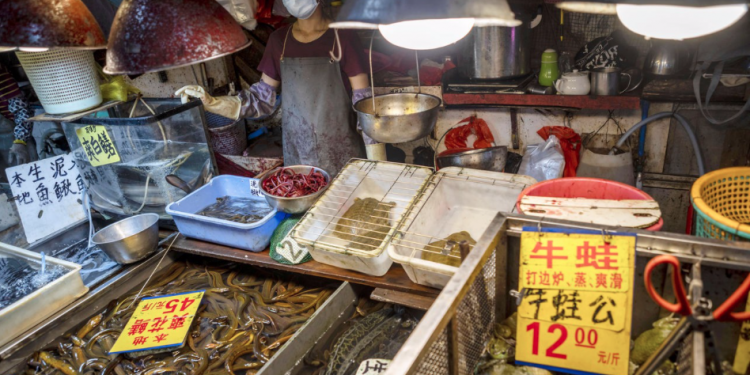Anthony Fauci, a well-respected immunologist on President Donald Trump’s coronavirus task-force, called for the worldwide banning of wet markets last month. He may have had in mind somewhere like Tomohon in Indonesia, according to this feature in The Economist. The highland town is surrounded by lush countryside in northern Sulawesi, home to the Minahasa people and an amazing diversity of wildlife.
Much of it makes its way to Tomohon’s covered market, where it is laid out on countless butchers’ slabs: warty pigs, flying foxes (actually, a fruit bat), reticulated pythons and the Sulawesi giant rat. Before feast days other specimens, all illegally caught, find their way to the stalls, among them the rare Celebes crested macaque, a large jet-black monkey, and the Sulawesi bear cuscus, a tree-dwelling marsupial. Domestic dogs in cages also wait their turn as traders with blow torches burn off slaughtered animals’ fur, setting their faces in a rictus grin. Even Minahasans revel in the market’s moniker: pasar extrim, the extreme market.
Dr Fauci is not alone in wanting wet markets banned. Scott Morrison, Australia’s prime minister, has called for their closure, as have American senators from both sides of the chamber. No wonder, you might think. It is not just the devastating effect they can have on a region’s biodiversity. Bustling markets selling live wild animals, often piled one atop the other, also give virologists the heebie-jeebies. Poor hygiene, animals kept in stressful conditions (which may affect their immune systems, making them more susceptible to disease) and traders and customers packed cheek-by-jowl can easily result in a “spillover” event, when a virus jumps from an animal into a human, causing a new disease, says Olivier Restif, a virologist at the University of Cambridge.
No one knows for sure whether the novel coronavirus got into humans in another live-animal market, this time in Wuhan, central China, the original centre of the covid-19 outbreak. It may have been an unhappy coincidence—any place that brings hundreds of humans together in close proximity has the potential to spread a disease. But many virologists think SARS-CoV-2, the virus that causes covid-19, originated in bats and then may have infected an intermediate species, possibly a pangolin, a scaly anteater prized for its meat and medicinal properties. What is undeniable is that Wuhan, in which live pangolins, civets and other wild species were sold, is exactly the sort of place where a new zoonotic disease might originate.
This Economist article on curbing the spread of zoonotic diseases in wet markets is free to read. More here…























